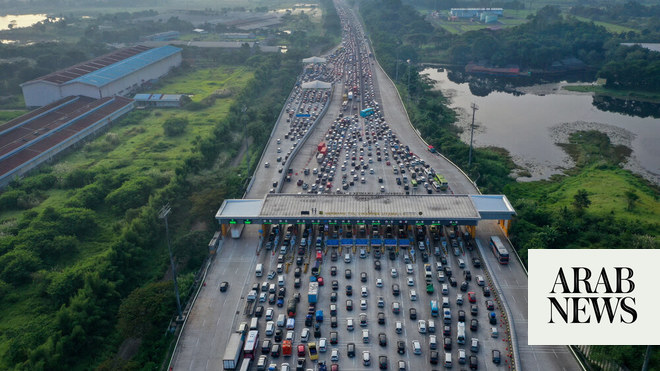
Some defy safety rules to celebrate end of Ramadan with families despite spike in virus cases
JAKARTA: Indonesians are preparing for a second successive year of muted Eid celebrations after the government rolled out new travel restrictions aimed at combating a spike in coronavirus disease (COVID-19) cases in the country.
The Southeast Asian nation has witnessed a steady rise in virus infection rates over the Ramadan holiday season and on May 6 imposed a 12-day nationwide travel ban in a bid to slow the spread of COVID-19.
However, Jakarta police said on Tuesday that an estimated 1.5 million people had still left the capital city by car to travel to their hometowns throughout Indonesia’s main island of Java, although the exodus was in stark contrast to the usual 8 million in pre-pandemic years.
The country’s transport ministry said almost 138,000 vehicles had driven out of Jakarta each day since the start of the travel ban.
Those staying in the capital were on Tuesday rocked when regional governments in Jakarta and its satellite cities made a joint last-minute announcement restricting people from traveling within the urban areas during the Eid holidays starting Wednesday.
Jakarta Gov. Anies Baswedan ordered shopping centers, restaurants, public places, entertainment venues, and even cemeteries, to close down until Sunday to prevent public gatherings during the holidays.
Indonesians also celebrate Eid by paying respects to deceased family members by praying at their graves.
Police set up checkpoints to monitor people traveling in and out of Jakarta to its suburban areas, which administratively are under neighboring West Java and Banten provinces.
The move has left Jakarta residents faced with the prospect of being unable to celebrate Eid with family members often only a 30 to 60-minute drive away.
“The government realizes that the Eid travel ban is not perfect in its implementation, but we still carry out the policy in accordance with the regulations,” national COVID-19 task force spokesman Wiku Adisasmito told a press briefing on Wednesday.
Meanwhile, there were reports of some travelers going the extra mile to meet relatives in defiance of the ban.
On the first day of the travel restrictions, police discovered a group of people hiding under vegetables in a truck during an inspection at Cikampek toll road, which connects Jakarta to cities across Java.
Others took the less-traveled routes, known as the rat road, to get to their destination despite the journey taking more time.
By the third day of the ban, police said at least 70,000 vehicles had been turned back from 318 checkpoints throughout the islands of Sumatra, Java, and Bali.
Aang Surmana, who works as a garbage collector in South Jakarta, told Arab News that he managed to reach his hometown in Tegal, Central Java, on Wednesday afternoon, after traveling on a motorcycle with his son for eight hours, as opposed to the regular travel time of six hours.
“I dodged the checkpoints by taking detours on village roads, and I tried to blend in like locals by traveling light, with just a small bag, so we didn’t look like we were traveling long distance with big bags,” he said.
Java, Indonesia’s most populated island where about half of its 270 million people live, has been contributing about 60 to 70 percent to the national COVID-19 caseload, with authorities saying people traveling out of the island to less-infected regions could lead to a surge in local infections.
Adisasmito said: “COVID-19 is not just Java’s problem. There could be a surge in cases in regions out of Java, even in less crowded and populated areas. If we don’t anticipate it, you could bring COVID-19 to your hometowns even though there were no cases there previously.”
On Wednesday, Indonesia reported 4,608 new infections, registering an average of 5,000 cases daily in recent weeks.
On Monday, Health Minister Budi Gunadi Sadikin said that three new variants of COVID-19 – from the UK, South Africa, and India – had been detected and were a cause for concern.
Nadia Yovani, a sociologist at the University of Indonesia, told Arab News that the rationale of COVID-19 prevention measures of avoiding mass gatherings defied the norms that Indonesians ascribed to festivities with their extended family members during the Eid holiday.
“Despite the hassles in the travel, people still travel to celebrate Eid, pandemic or not. It is part of their struggles to fulfill their spiritual needs to conclude Ramadan by celebrating it with their families,” she said.
“In pandemic times, authorities and spiritual leaders should introduce a new perspective on how to celebrate Eid with a different format than the usual one,” she added.












